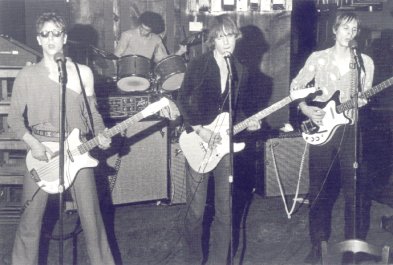
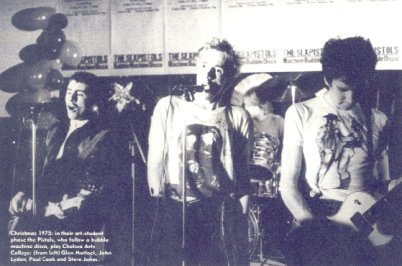
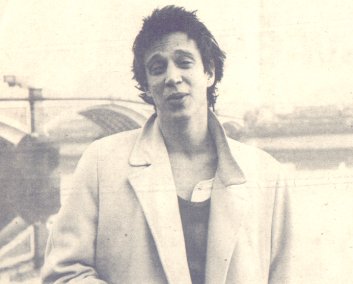
In 1980 Richard Hell wrote a
regular column for the New York
Alternative paper 'East Village Eye'.
Hell's column 'Slum Journal' didn't
usually concern itself with music.
But March 1980's piece turned
briefly to the subject close to his
heart: the story of punk and the
way he believes lazy journalism
have put a twist in the tale.
". . . the journalist declared, in three columns,
that the Investigator, Erik Lonrott, had
dedicated himself to studying the names of
God in order to come across the name of the
murderer. Lonrott, accustomed to the
simplifications of journalism, did not become
indignant."
-Jorge Luis Borges "Death And The
Compass"
regular column for the New York
Alternative paper 'East Village Eye'.
Hell's column 'Slum Journal' didn't
usually concern itself with music.
But March 1980's piece turned
briefly to the subject close to his
heart: the story of punk and the
way he believes lazy journalism
have put a twist in the tale.
". . . the journalist declared, in three columns,
that the Investigator, Erik Lonrott, had
dedicated himself to studying the names of
God in order to come across the name of the
murderer. Lonrott, accustomed to the
simplifications of journalism, did not become
indignant."
-Jorge Luis Borges "Death And The
Compass"
| "I WAS ROBBED!" Or: How I invented Punk Rock By Richard Hell |
MY MOTIVES for becoming a columnist for the East Village Eye were largely created by my
experience as an aspiring public figure, rock and roll variety. After seeing the music writers in action, I
wanted (and still want) to be able to talk about them and back to them without having to talk to them.
But then I kept putting off writing about them until now for fear it would seem like sour grapes, and
because the lies were probably no greater in proportion to the positive and flattering 'news' than in
gossip on a neighbourhood level.
Still, there is at least one thing about the processes of journalism that I'm sure is worth pointing out:
namely that, at least in music writing, half of the material printed is untrue. I've sworn to ignore them,
but, at the risk of looking as bad as they do, I've got to get all this off my chest before aspiring to Erik
Lonrott's calm.
The clearest example of the phenomenon in this case, and most controversial, is my role as an
originator of many traits that became identified as 'punk' or 'new wave'.
The fact is that London punk was copied from New York punk in 1976. English punk was created in
that year when Malcolm McLaren tutored his associate in the clothing business, Bernard Rhodes,
and the two bands they immediately formed. The Sex Pistols and The Clash, in the styles which
Malcolm brought back to England from me (Television) and The New York Dolls (who were already
famous there). The only strong stylistic trait of the two British groups that wasn't taken directly from
the Dolls - their sound, primarily - or me was their political emphasis, which was Malcolm's speciality.
(When he managed the Dolls for the last six or eight months before they broke up, he dressed them
all in red leather and had them play before a giant Communist flag backdrop.)
experience as an aspiring public figure, rock and roll variety. After seeing the music writers in action, I
wanted (and still want) to be able to talk about them and back to them without having to talk to them.
But then I kept putting off writing about them until now for fear it would seem like sour grapes, and
because the lies were probably no greater in proportion to the positive and flattering 'news' than in
gossip on a neighbourhood level.
Still, there is at least one thing about the processes of journalism that I'm sure is worth pointing out:
namely that, at least in music writing, half of the material printed is untrue. I've sworn to ignore them,
but, at the risk of looking as bad as they do, I've got to get all this off my chest before aspiring to Erik
Lonrott's calm.
The clearest example of the phenomenon in this case, and most controversial, is my role as an
originator of many traits that became identified as 'punk' or 'new wave'.
The fact is that London punk was copied from New York punk in 1976. English punk was created in
that year when Malcolm McLaren tutored his associate in the clothing business, Bernard Rhodes,
and the two bands they immediately formed. The Sex Pistols and The Clash, in the styles which
Malcolm brought back to England from me (Television) and The New York Dolls (who were already
famous there). The only strong stylistic trait of the two British groups that wasn't taken directly from
the Dolls - their sound, primarily - or me was their political emphasis, which was Malcolm's speciality.
(When he managed the Dolls for the last six or eight months before they broke up, he dressed them
all in red leather and had them play before a giant Communist flag backdrop.)
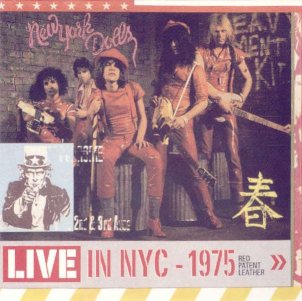
Now, none of this is difficult to establish,and this is
not to give it much weight, but it's the sort of petty
subject that fascinates journalists, and I resent the
large number of obnoxious and embarrassing
(untrue and/or out of context) lines they've written
in discussing it. Virtually none of these writers care
about writing the truth or making the simplest fact
check because they know that their readers will
accept any statement they see in a newspaper or
magazine as fact if the writer presents it as such.If
a passing sentence says Hell started ripping his
shirts in imitation of the pictures he found in
English fan magazines, as a writer named Cynthia
Heimel wrotes in New York magazine a few weeks
ago, a reader will believe it without questation. The
writers knowing this use the papers to present their
opinions and attitudes in the guise of the truth by
fabricating entire sets of information to their theses.
not to give it much weight, but it's the sort of petty
subject that fascinates journalists, and I resent the
large number of obnoxious and embarrassing
(untrue and/or out of context) lines they've written
in discussing it. Virtually none of these writers care
about writing the truth or making the simplest fact
check because they know that their readers will
accept any statement they see in a newspaper or
magazine as fact if the writer presents it as such.If
a passing sentence says Hell started ripping his
shirts in imitation of the pictures he found in
English fan magazines, as a writer named Cynthia
Heimel wrotes in New York magazine a few weeks
ago, a reader will believe it without questation. The
writers knowing this use the papers to present their
opinions and attitudes in the guise of the truth by
fabricating entire sets of information to their theses.
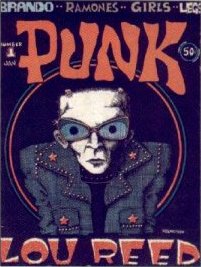
All that would have been necessary from Heimel, for instance, was a phone call. (She might have
been referred to Punk magazine #3 of April 1976 that contains an interview and photos of me
wearing ripped and safety-pinned T-shirts made a year before the first English punk groups were
manufactured.) The point is that the writers don't care because they know how intimidating
newsprint is to the ordinary reader.
One would think that New York (if not American) chauvinism would weight at least local writers
toward those particular facts, but they are so astonishingly petty that a different kind of pride
interfered: the Heimel type is so intent on seeming to be among the avant chic that she has to
pretend to be a real punk-initiate, a real insider, by picking out others to describe as derivative. It's
really disgusting and happens every' day.
been referred to Punk magazine #3 of April 1976 that contains an interview and photos of me
wearing ripped and safety-pinned T-shirts made a year before the first English punk groups were
manufactured.) The point is that the writers don't care because they know how intimidating
newsprint is to the ordinary reader.
One would think that New York (if not American) chauvinism would weight at least local writers
toward those particular facts, but they are so astonishingly petty that a different kind of pride
interfered: the Heimel type is so intent on seeming to be among the avant chic that she has to
pretend to be a real punk-initiate, a real insider, by picking out others to describe as derivative. It's
really disgusting and happens every' day.
FOR THE RECORD, and in chronological order, the groups that
established the characteristics that soon became identified as
new wave, and who predated Malcolm's single contribution of an
overt political message, were The New York Dolls (the bridge
from the previous era and most responsible for the sound that
became known as punk), Television (while I was in it), The
Ramones, Patti Smith, and then jalso Blondie, Talking Heads,
and The Heartbreakers. All these groups existed before any
English punk, which was modeled on them.
Television was the turning point. I originated virtually all the
visuals - haircut, torn (via Patti) and safety-pinned clothes, '50s
suits with loosened ties, leather jackets (which The Ramones
soon improved on), and shirts with scattered geometrical shapes
(initiated by Verlaine) and personal messages drawn on them
(the first being "please kill me" which Richard Lloyd was talked
into wearing at Max's one night).
established the characteristics that soon became identified as
new wave, and who predated Malcolm's single contribution of an
overt political message, were The New York Dolls (the bridge
from the previous era and most responsible for the sound that
became known as punk), Television (while I was in it), The
Ramones, Patti Smith, and then jalso Blondie, Talking Heads,
and The Heartbreakers. All these groups existed before any
English punk, which was modeled on them.
Television was the turning point. I originated virtually all the
visuals - haircut, torn (via Patti) and safety-pinned clothes, '50s
suits with loosened ties, leather jackets (which The Ramones
soon improved on), and shirts with scattered geometrical shapes
(initiated by Verlaine) and personal messages drawn on them
(the first being "please kill me" which Richard Lloyd was talked
into wearing at Max's one night).
The first English punks also lifted a lot of ideas from such things as Punk magazine an our songs,
such as '(I Belong To The) Blank Generation' (soon to become 'Pretty Vacant'), 'Love Comes in
Spurts', 'I Don't Care', and 'You Gotta Lose', which were performed regularly at CBGB by
Television in the same pre-British period. All of this is documented in the New York press of
1974-75.
(I will insert a little overt advertisement here.) This whole subject arose again in part because I've
been working on a four song EP that contains two of those early songs. They were incredibly
chaotic, hard-driving rock and roll songs (music by a different Verlaine than later recorded),
influenced mainly by The Velvet Underground and the sort of American punk of the late '60's that
was made by the groups on Lenny Kaye's 'Nuggets' album, like The Standells, The Shadows of
Knight, The Seeds, etc., and The Stooges. The other main line, at least for for me (I got most of
my music education from Verlaine), was the mid-'60s English Invasion of The Beatles, Them, The
Who, The Kinks, The Rolling Stones, and The Yardbirds (and the '50s rock and roll that
comprised half of all those groups' repertoire).
We've recently finished re-mixing two of the tracks that Verlaine and I recorded in 1973 with Billy
Ficca on drums in a four-track basement studio in Brooklyn. They've just been issued on Alan
Betrock's new Shake Records as an extended play 45 with two new songs: 'Don't Die' and 'Time'
by me and the Voidoids on one side and 'Love Cornes in Spurts' (no resemblance, outside of the
title, musically or lyrically, to later recorded versions) and 'That's All I Know (Right Now)' by The
Neon Boys on the other.
These latter songs were the dying words of the group we called The Neon Boys, which lived
maybe six months altogether. It was my first group, my first attempt to play bass, and my first visit
to a studio (we never reached the point of playing in public). A few months after we made the
tape, Terry Ork brought us Richard Lloyd and we formed Television with The Neon Boys material
for a repertoire. But in a real way they were the first modern punk songs recorded; The Dolls are
the only other ontenders.
such as '(I Belong To The) Blank Generation' (soon to become 'Pretty Vacant'), 'Love Comes in
Spurts', 'I Don't Care', and 'You Gotta Lose', which were performed regularly at CBGB by
Television in the same pre-British period. All of this is documented in the New York press of
1974-75.
(I will insert a little overt advertisement here.) This whole subject arose again in part because I've
been working on a four song EP that contains two of those early songs. They were incredibly
chaotic, hard-driving rock and roll songs (music by a different Verlaine than later recorded),
influenced mainly by The Velvet Underground and the sort of American punk of the late '60's that
was made by the groups on Lenny Kaye's 'Nuggets' album, like The Standells, The Shadows of
Knight, The Seeds, etc., and The Stooges. The other main line, at least for for me (I got most of
my music education from Verlaine), was the mid-'60s English Invasion of The Beatles, Them, The
Who, The Kinks, The Rolling Stones, and The Yardbirds (and the '50s rock and roll that
comprised half of all those groups' repertoire).
We've recently finished re-mixing two of the tracks that Verlaine and I recorded in 1973 with Billy
Ficca on drums in a four-track basement studio in Brooklyn. They've just been issued on Alan
Betrock's new Shake Records as an extended play 45 with two new songs: 'Don't Die' and 'Time'
by me and the Voidoids on one side and 'Love Cornes in Spurts' (no resemblance, outside of the
title, musically or lyrically, to later recorded versions) and 'That's All I Know (Right Now)' by The
Neon Boys on the other.
These latter songs were the dying words of the group we called The Neon Boys, which lived
maybe six months altogether. It was my first group, my first attempt to play bass, and my first visit
to a studio (we never reached the point of playing in public). A few months after we made the
tape, Terry Ork brought us Richard Lloyd and we formed Television with The Neon Boys material
for a repertoire. But in a real way they were the first modern punk songs recorded; The Dolls are
the only other ontenders.
As I was saying, I began
writing for this paper in order
to have some public access
without having to speak to
journalists. I had decided to
start my music career over
with the benefit of what I had
learned. This applied to my
relationship with music
papers as well. I had
originally planned to stop
dealing with em altogether
and use this space instead
though this is the first time
I've written about music).
writing for this paper in order
to have some public access
without having to speak to
journalists. I had decided to
start my music career over
with the benefit of what I had
learned. This applied to my
relationship with music
papers as well. I had
originally planned to stop
dealing with em altogether
and use this space instead
though this is the first time
I've written about music).
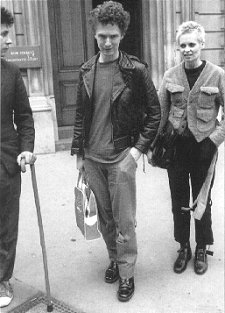
Since then, in order not to seem to be abusing myself and record companies that invest in me
pointless harm, I've modified this essay I'll answer in writing any inquiries from commercial papers
at the rate they give their peer journalists. Of course, I don't expect this to happen very often
and so I'm going to use this opportunity to get these arguments about the past out of the way
and onto the record for good.
The order that the events occurred is a matter of record, though there may be some disputing of
exactly how and why things happened this way, I give my explanation.
NEW WAVE music was carried in its entirety from New York to London by Malcolm McLaren and
The Ramones. The Ramones, by touring in 1976, and Malcolm, by bringing the news of
Television and our styles and attitudes to the kids he attracted with copies of my clothes to his
clothing store in London, SEX. (As well as on the racks, he had the Punk interview mentioned
above hanging on the walls there when he was recruiting the members of the Pistols).
pointless harm, I've modified this essay I'll answer in writing any inquiries from commercial papers
at the rate they give their peer journalists. Of course, I don't expect this to happen very often
and so I'm going to use this opportunity to get these arguments about the past out of the way
and onto the record for good.
The order that the events occurred is a matter of record, though there may be some disputing of
exactly how and why things happened this way, I give my explanation.
NEW WAVE music was carried in its entirety from New York to London by Malcolm McLaren and
The Ramones. The Ramones, by touring in 1976, and Malcolm, by bringing the news of
Television and our styles and attitudes to the kids he attracted with copies of my clothes to his
clothing store in London, SEX. (As well as on the racks, he had the Punk interview mentioned
above hanging on the walls there when he was recruiting the members of the Pistols).
We had deliberately started a scene in New York
(1974-75) by convincing Hilly Kristal, the owner of
CBGBs, a Hell's Angel and wino hangout on the Bowery
to let Television present live music there every Sunday
night. Like the Dolls at the Mercer Arts Centre, we figured
that was the best strategy for acquiring a following.
It worked, and The Ramones soon formed (we knew Dee
Dee) and started playing there. Patti Smith, who was still
reading poetry with ten-minute interludes of electric guitar
accompaniment from Lenny Kaye, wrote about us in Hit
Parader and soon was playing there as her band
expanded. We were being written about in the newly
founded SoHo News, Interview and the Voice, getting the
same kind of coverage in N.Y. as The Velvet
Underground or Dolls had.
But as the scene grew it looked more influential than that,
and as short-haired and unpracticed driven new groups
formed.
(1974-75) by convincing Hilly Kristal, the owner of
CBGBs, a Hell's Angel and wino hangout on the Bowery
to let Television present live music there every Sunday
night. Like the Dolls at the Mercer Arts Centre, we figured
that was the best strategy for acquiring a following.
It worked, and The Ramones soon formed (we knew Dee
Dee) and started playing there. Patti Smith, who was still
reading poetry with ten-minute interludes of electric guitar
accompaniment from Lenny Kaye, wrote about us in Hit
Parader and soon was playing there as her band
expanded. We were being written about in the newly
founded SoHo News, Interview and the Voice, getting the
same kind of coverage in N.Y. as The Velvet
Underground or Dolls had.
But as the scene grew it looked more influential than that,
and as short-haired and unpracticed driven new groups
formed.
Punk magazine appeared and, just when Malcolm, then the Dolls' manager, turned up and
began hanging out at CBGBs, independent records began to be pressed. But it was still
confined to New York City, which was the advantage Malcolm had.
The great advantages of England for good new rock and roll are: one, that It's taken as
seriously by the U.S. press as our own charts, and two, that because the whole place isn't
much bigger than New York, news travels fast there and similar events gain the importance for
the whole nation as would be given them by the local press in a city the size of New York. In
other words, the number one new group in London is not only necessarily the #1 in Britain
(even The Beatles moved there quickly), but is considered by Americans to be the equivalent
of American national news here. (I'm glad that this was true because it greatly benefited the
scene here and good rock and roll everywhere, but it is the phenomenon responsible for the
spectacle of American asshole journalists trying to look like they belong with the hipsters on the
bandwagon they hopped by means of pontifications on the authenticity of the styles they're
trying so desperately to adopt.)
It's amazing how much looser the British national press is than ours. The most influential music
papers are the London weekly tabloids New Musical Express, Sounds, and Melody Maker, that
operate for the whole country with the flexibility of a neighbourhood newspaper.
They got here long before our own national press. I have the clipping from when NME's Nick
Kent, who had heard about us from Malcolm, did about three pages with pictures on me just as
we were getting The Heartbreakers off the ground in early '76 (issue of March 27), that
described the whole scene in minute detail, bemoaning the lack of such fertility in Britain with
these words: "The immediate ramifications of this burgeoning N.Y. rock scene were actually felt
by yours truly on his immediate return to the Old Country by simply noting the shocking lack of
any new bands playing parallel London venues to CBGBs and the like who even seemed aware
that rock and roll could be something more than a mindlessly competent regurgitation of old
licks. The fact is that just about every band with the marked exception of the unique and very
wonderful Roogalator and also, possibly, The Sex Pistols (themselves a rather obvious New
York consciousness band who fortunately anchor this pitch firmly within their Shepherd's Bush
origins and outlook), seem totally unwilling to even dare commit themselves to commenting on
their environment, to develop a decently relevant attitude to current times. In the final analysis,
this whole New York thing , this new perspective, by rights should not be confined to the
incestuous precincts of downtown Manhattan. It should be usurped absolutely everywhere new
rock 'n' roll is being shaped and formed." (This was one of the first mentions of the Pistols in
print.)
began hanging out at CBGBs, independent records began to be pressed. But it was still
confined to New York City, which was the advantage Malcolm had.
The great advantages of England for good new rock and roll are: one, that It's taken as
seriously by the U.S. press as our own charts, and two, that because the whole place isn't
much bigger than New York, news travels fast there and similar events gain the importance for
the whole nation as would be given them by the local press in a city the size of New York. In
other words, the number one new group in London is not only necessarily the #1 in Britain
(even The Beatles moved there quickly), but is considered by Americans to be the equivalent
of American national news here. (I'm glad that this was true because it greatly benefited the
scene here and good rock and roll everywhere, but it is the phenomenon responsible for the
spectacle of American asshole journalists trying to look like they belong with the hipsters on the
bandwagon they hopped by means of pontifications on the authenticity of the styles they're
trying so desperately to adopt.)
It's amazing how much looser the British national press is than ours. The most influential music
papers are the London weekly tabloids New Musical Express, Sounds, and Melody Maker, that
operate for the whole country with the flexibility of a neighbourhood newspaper.
They got here long before our own national press. I have the clipping from when NME's Nick
Kent, who had heard about us from Malcolm, did about three pages with pictures on me just as
we were getting The Heartbreakers off the ground in early '76 (issue of March 27), that
described the whole scene in minute detail, bemoaning the lack of such fertility in Britain with
these words: "The immediate ramifications of this burgeoning N.Y. rock scene were actually felt
by yours truly on his immediate return to the Old Country by simply noting the shocking lack of
any new bands playing parallel London venues to CBGBs and the like who even seemed aware
that rock and roll could be something more than a mindlessly competent regurgitation of old
licks. The fact is that just about every band with the marked exception of the unique and very
wonderful Roogalator and also, possibly, The Sex Pistols (themselves a rather obvious New
York consciousness band who fortunately anchor this pitch firmly within their Shepherd's Bush
origins and outlook), seem totally unwilling to even dare commit themselves to commenting on
their environment, to develop a decently relevant attitude to current times. In the final analysis,
this whole New York thing , this new perspective, by rights should not be confined to the
incestuous precincts of downtown Manhattan. It should be usurped absolutely everywhere new
rock 'n' roll is being shaped and formed." (This was one of the first mentions of the Pistols in
print.)
Well, he got his wish, but I
wouldn't be surprised if that
particular article is what got
him chain-whipped by Sid a
little later.
The first few English groups
were very self-conscious
about their origins because
so much of their notoriety
was due to what seemed so
astoundingly unique about
them (while they knew that
there existed a few local
travellers who'd seen where
they'd copped their act).
wouldn't be surprised if that
particular article is what got
him chain-whipped by Sid a
little later.
The first few English groups
were very self-conscious
about their origins because
so much of their notoriety
was due to what seemed so
astoundingly unique about
them (while they knew that
there existed a few local
travellers who'd seen where
they'd copped their act).
They vehemently put down all things American ('I'm So Bored With The U.S.A.' by The Clash)
and particularly New York ('New York' by The Sex Pistols) in public. (England today is so
derivative of the U.S. that it's practically a diluted version, which understandably enrages the
kids, but it's pretty ironic that they rallied behind these musical expressions that were made
partly to disguise their own U.S. origins).
But privately, the first times I met both Glen Matlock and Sid Vicious they each surprised me by
insisting on continuously apologising for the theft of specific riffs and ideas I hadn't even noticed
they'd used.But it is the media people who are the villains, ideas are public property, they were
meant to draw attention anyway, and you can come up with as many more as you need to
replace the ones that get worn.
The very largest of the American papers, including the ones like Rolling Stone that supposedly
specialise in music, are the ones that invariably begin their essays into 'punk' with the blanket
statement that it originated in England, often followed by a few overt thrusts at denigrating the
supposedly secondhand American counterparts. That is insulting. They do it out of a stronger
self-interest than chauvinism: the hope of locking competent as journalists, which prevents them
from admitting they were two years behind the news when they read about it in the British press.
They move so slowly because, unlike their colleagues there, they are huge and therefore
extremely conservative, using other freer journalists as their sources rather than the actual
news events.
It's also an insult to the large number of American rockers who have been misled by it into
thinking that they got their culture secondhand.
I think I've just about gotten this out of my system, and I hope it will have an effect on the way
you read these papers. Even straight interviews, or maybe especially interviews, since they
appear, with their quotation marks and all, to be so certainly legitimate.
Finding the truth in a newspaper article is about as easy as guessing the title of an abstract
expressionist painting. I know how hard it is to be aware of - I still can't help forming opinions on
the basis of newspaper 'information'. And in the long run one can't help being affected by it.
But do be sceptical, because the effects of untrue information from trusted establishments can
have the nastiest effects on its subjects. For instance, the rumour the FBI has admitted to
starting, and which the press promulgated, concerning Jean Seberg (whose stillborn baby was
falsely rumoured to have been black) that eventually led to her suicide. A doubly uncountable
number of such journalistic crimes, and many many more with effects of lesser atrocity, are
never exposed. The writers know denials just emphasise the issue while making the accused
look foolish. In fact the papers have such power they should be legally forced to supply on
demand the proof of any statement they make that's not preceded by the words, "in my
opinion," or an attribution, in the same way politicians have to report the sources of their income.
To close out I'll make one more clarification: that I'm an appreciator of lots of modern British
groups (particularly the earliest ones' latest music) and could have spent these paragraphs
admiring their famous variations on our theme, but obviously that wasn't my purpose, and I'll be
glad to return next issue to subjects anoVaims more conducive to good writing than music-
industry criticism.
© Richard Hall 1980
and particularly New York ('New York' by The Sex Pistols) in public. (England today is so
derivative of the U.S. that it's practically a diluted version, which understandably enrages the
kids, but it's pretty ironic that they rallied behind these musical expressions that were made
partly to disguise their own U.S. origins).
But privately, the first times I met both Glen Matlock and Sid Vicious they each surprised me by
insisting on continuously apologising for the theft of specific riffs and ideas I hadn't even noticed
they'd used.But it is the media people who are the villains, ideas are public property, they were
meant to draw attention anyway, and you can come up with as many more as you need to
replace the ones that get worn.
The very largest of the American papers, including the ones like Rolling Stone that supposedly
specialise in music, are the ones that invariably begin their essays into 'punk' with the blanket
statement that it originated in England, often followed by a few overt thrusts at denigrating the
supposedly secondhand American counterparts. That is insulting. They do it out of a stronger
self-interest than chauvinism: the hope of locking competent as journalists, which prevents them
from admitting they were two years behind the news when they read about it in the British press.
They move so slowly because, unlike their colleagues there, they are huge and therefore
extremely conservative, using other freer journalists as their sources rather than the actual
news events.
It's also an insult to the large number of American rockers who have been misled by it into
thinking that they got their culture secondhand.
I think I've just about gotten this out of my system, and I hope it will have an effect on the way
you read these papers. Even straight interviews, or maybe especially interviews, since they
appear, with their quotation marks and all, to be so certainly legitimate.
Finding the truth in a newspaper article is about as easy as guessing the title of an abstract
expressionist painting. I know how hard it is to be aware of - I still can't help forming opinions on
the basis of newspaper 'information'. And in the long run one can't help being affected by it.
But do be sceptical, because the effects of untrue information from trusted establishments can
have the nastiest effects on its subjects. For instance, the rumour the FBI has admitted to
starting, and which the press promulgated, concerning Jean Seberg (whose stillborn baby was
falsely rumoured to have been black) that eventually led to her suicide. A doubly uncountable
number of such journalistic crimes, and many many more with effects of lesser atrocity, are
never exposed. The writers know denials just emphasise the issue while making the accused
look foolish. In fact the papers have such power they should be legally forced to supply on
demand the proof of any statement they make that's not preceded by the words, "in my
opinion," or an attribution, in the same way politicians have to report the sources of their income.
To close out I'll make one more clarification: that I'm an appreciator of lots of modern British
groups (particularly the earliest ones' latest music) and could have spent these paragraphs
admiring their famous variations on our theme, but obviously that wasn't my purpose, and I'll be
glad to return next issue to subjects anoVaims more conducive to good writing than music-
industry criticism.
© Richard Hall 1980

